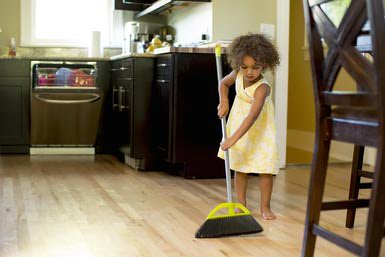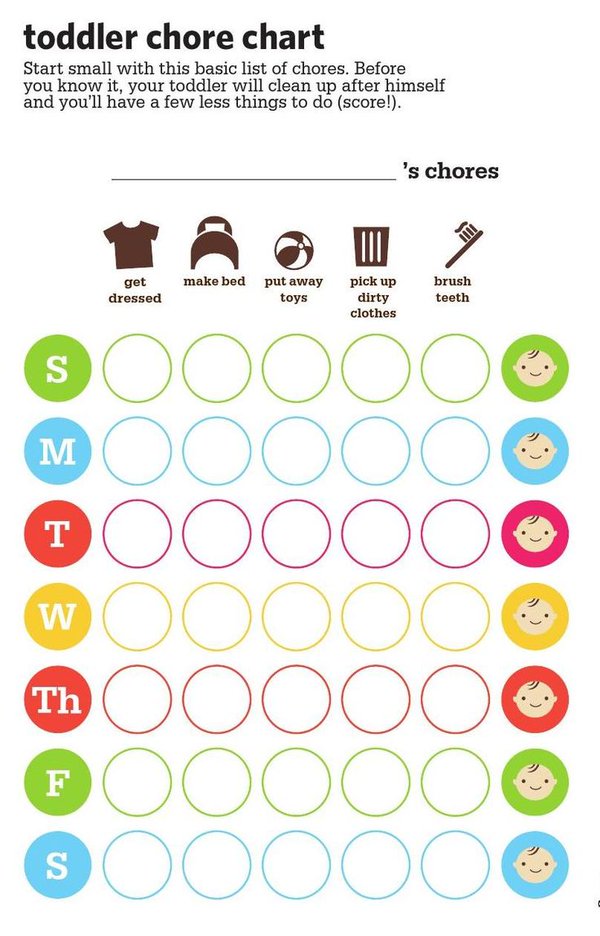
Many parents start off with good intentions when it comes to chores and their children. They make “chore charts”, sit down with their children and explain how to meticulously tackle each chore step by step. It doesn’t take long to figure out that a small child isn’t going to complete the job with the same perfection and success that you are – and that’s when the chores slowly start to fall back into your lap. What parents need to understand is that the actual chores are not what is most important here; but rather the huge benefits that come from being given such responsibilities. Here are 6 fantastic benefits to giving children household chores. 1. Children Who Have Chores Are More Successful As Adults Dr. Martin Rossman from the University of Minnesota undertook a longitudinal study (subjects were followed up over a period of 20 years) which revealed that one of the best predictors of a child’s success is if he or she began helping with household chores at age 3 to 4. These children were less likely to use drugs and had better relationships, among many other significant benefits. When children are given jobs to do when they are younger, they will develop confidence in their ability to complete tasks. This goes for very young children as well, because they are the ones always begging to help out with the cooking, the cleaning or the gardening. Many parents of toddlers will be familiar with their dishwasher being hijacked by a well-meaning two or three year old wanting to help unstack it! Yet, many parents, tell young children “no, when you’re bigger”, or “you’re too little to do this!”, when actually we should be letting them try little tasks (that are safe and suitable for their age group) so our children can feel the success of doing something new on their own. Many times, it’s more convenient as parents to just do it ourselves, to save time or make sure it’s done correctly, but we are missing out on valuable opportunities to help our children gain confidence. It could be the difference between a ‘can-do’ attitude and an ‘I can’t do it’ attitude as they grow up. 2. Hands On Movement Will Help The Child With Gross And Fine Motor Skills There are so many opportunities for small children to work with their hands around the house. Helping in the kitchen by measuring ingredients or drying dishes; helping in the garden by raking dirt or pulling weeds; and even chores such as dusting or sweeping are great for gross motor skills. There are also opportunities to incorporate math or reading into chores. Tell your child to count out four potatoes, or have them dust only the items that have the letter D in them. Making it fun and helpful will keep your child engaged for a longer period of time. 3. Children Who Have Chores Learn To Work Well With Others If you have more than one child, have them work on a chore together. If not, you can have your child complete different jobs along with you. It’s great for kids to compromise and assign themselves different roles, because it teaches them to be flexible. For example, one night you could wash the dishes and your child could rinse or dry, and then you switch roles the next night. 4. Chores Will Teach Your Child About Delayed Gratification Some parents may choose to reward chores with an allowance. Others might give their child a special treat at the end of the week if all of the chores were done. Whatever the currency is for your child completing chores, it is teaching him about delayed gratification; or working towards something later on. In this world of “immediate gratification”, it’s good for kids to see that they aren’t always compensated immediately for their actions. Sometimes, the compensation for chores might be that mom has time to play a board game on Saturday. This is teaching the child that if he helps mom with the chores, he will benefit from it in the long run. 5. Chores Give Children A Purpose Helping do things around the house makes a child feel a sense of ownership; like she is an important part of the household. This shows the child that you need and appreciate her help, so she will be more apt to want to help out on her own in the future. Kids want to feel important, and what is more important than helping the household run smoothly? They will feel like they have contributed to the well-being of the family, which in turn will build confidence and self-esteem. Children who participate in chores have been shown to be happier, even if they feel like the chore is a burden at the time. 7. It Teaches Self Discipline There are many things in life that we have to do, even if we don’t feel like doing it. It’s often said that successful people are good at doing what other people don’t want to do or couldn’t be bothered doing – they have great self discipline. It’s so important to be able to ‘show up’ in areas of your life even when you don’t feel like it – this includes school, work and even relationships. Self discipline is an essential skill required to do well in many areas of life. Making Chores Work For Your Family Firstly, its a good idea not to tie pocket money (allowance money) into your children’s chores. It’s important for them to associate chores as contribution to something bigger – not an activity you’d only do for monetary gain. It’s okay to give them an allowance, but do not use it as a payment for doing their chores. You don’t want them to be motivated by money or you’ve lost the valuable lessons. When you begin a chores routine in your home, naturally there can be some resistance, especially while it’s all new. However, don’t give up! Chores are always easier when you make it fun, manageable and when you do it together. Families are all about support and togetherness – and when everyone pitches in with chores, it reinforces that message. Put on some boppy music and you’ll be surprised how much it lifts the mood in the house, especially while everyone is helping with the chores together as a family. Don’t get stuck in a mindset of ’it’s just easier and quicker if I do it,’ because you’ll lose the opportunity for your children to learn valuable, lifelong lessons and become more skilled at the tasks they have been given. Sure, the dishwasher may get loaded like an overflowing toy box, but its an opportunity to show them how to stack cups or plates in a better way. Once they realise they are responsible for doing their chores (and mum or dad aren’t going to let them off the hook!), you’d be surprised how quickly they become efficient loaders of the dishwasher. Before you know it, the children will drop right into their new routine and you wont need to nudge them along so much. – See more at:
http://www.bellybelly.com.au/child/big-ways-your-children-benefit-from-having-chores/



 Many parents start off with good intentions when it comes to chores and their children. They make “chore charts”, sit down with their children and explain how to meticulously tackle each chore step by step. It doesn’t take long to figure out that a small child isn’t going to complete the job with the same perfection and success that you are – and that’s when the chores slowly start to fall back into your lap. What parents need to understand is that the actual chores are not what is most important here; but rather the huge benefits that come from being given such responsibilities. Here are 6 fantastic benefits to giving children household chores. 1. Children Who Have Chores Are More Successful As Adults Dr. Martin Rossman from the University of Minnesota undertook a longitudinal study (subjects were followed up over a period of 20 years) which revealed that one of the best predictors of a child’s success is if he or she began helping with household chores at age 3 to 4. These children were less likely to use drugs and had better relationships, among many other significant benefits. When children are given jobs to do when they are younger, they will develop confidence in their ability to complete tasks. This goes for very young children as well, because they are the ones always begging to help out with the cooking, the cleaning or the gardening. Many parents of toddlers will be familiar with their dishwasher being hijacked by a well-meaning two or three year old wanting to help unstack it! Yet, many parents, tell young children “no, when you’re bigger”, or “you’re too little to do this!”, when actually we should be letting them try little tasks (that are safe and suitable for their age group) so our children can feel the success of doing something new on their own. Many times, it’s more convenient as parents to just do it ourselves, to save time or make sure it’s done correctly, but we are missing out on valuable opportunities to help our children gain confidence. It could be the difference between a ‘can-do’ attitude and an ‘I can’t do it’ attitude as they grow up. 2. Hands On Movement Will Help The Child With Gross And Fine Motor Skills There are so many opportunities for small children to work with their hands around the house. Helping in the kitchen by measuring ingredients or drying dishes; helping in the garden by raking dirt or pulling weeds; and even chores such as dusting or sweeping are great for gross motor skills. There are also opportunities to incorporate math or reading into chores. Tell your child to count out four potatoes, or have them dust only the items that have the letter D in them. Making it fun and helpful will keep your child engaged for a longer period of time. 3. Children Who Have Chores Learn To Work Well With Others If you have more than one child, have them work on a chore together. If not, you can have your child complete different jobs along with you. It’s great for kids to compromise and assign themselves different roles, because it teaches them to be flexible. For example, one night you could wash the dishes and your child could rinse or dry, and then you switch roles the next night. 4. Chores Will Teach Your Child About Delayed Gratification Some parents may choose to reward chores with an allowance. Others might give their child a special treat at the end of the week if all of the chores were done. Whatever the currency is for your child completing chores, it is teaching him about delayed gratification; or working towards something later on. In this world of “immediate gratification”, it’s good for kids to see that they aren’t always compensated immediately for their actions. Sometimes, the compensation for chores might be that mom has time to play a board game on Saturday. This is teaching the child that if he helps mom with the chores, he will benefit from it in the long run. 5. Chores Give Children A Purpose Helping do things around the house makes a child feel a sense of ownership; like she is an important part of the household. This shows the child that you need and appreciate her help, so she will be more apt to want to help out on her own in the future. Kids want to feel important, and what is more important than helping the household run smoothly? They will feel like they have contributed to the well-being of the family, which in turn will build confidence and self-esteem. Children who participate in chores have been shown to be happier, even if they feel like the chore is a burden at the time. 7. It Teaches Self Discipline There are many things in life that we have to do, even if we don’t feel like doing it. It’s often said that successful people are good at doing what other people don’t want to do or couldn’t be bothered doing – they have great self discipline. It’s so important to be able to ‘show up’ in areas of your life even when you don’t feel like it – this includes school, work and even relationships. Self discipline is an essential skill required to do well in many areas of life. Making Chores Work For Your Family Firstly, its a good idea not to tie pocket money (allowance money) into your children’s chores. It’s important for them to associate chores as contribution to something bigger – not an activity you’d only do for monetary gain. It’s okay to give them an allowance, but do not use it as a payment for doing their chores. You don’t want them to be motivated by money or you’ve lost the valuable lessons. When you begin a chores routine in your home, naturally there can be some resistance, especially while it’s all new. However, don’t give up! Chores are always easier when you make it fun, manageable and when you do it together. Families are all about support and togetherness – and when everyone pitches in with chores, it reinforces that message. Put on some boppy music and you’ll be surprised how much it lifts the mood in the house, especially while everyone is helping with the chores together as a family. Don’t get stuck in a mindset of ’it’s just easier and quicker if I do it,’ because you’ll lose the opportunity for your children to learn valuable, lifelong lessons and become more skilled at the tasks they have been given. Sure, the dishwasher may get loaded like an overflowing toy box, but its an opportunity to show them how to stack cups or plates in a better way. Once they realise they are responsible for doing their chores (and mum or dad aren’t going to let them off the hook!), you’d be surprised how quickly they become efficient loaders of the dishwasher. Before you know it, the children will drop right into their new routine and you wont need to nudge them along so much. – See more at:
Many parents start off with good intentions when it comes to chores and their children. They make “chore charts”, sit down with their children and explain how to meticulously tackle each chore step by step. It doesn’t take long to figure out that a small child isn’t going to complete the job with the same perfection and success that you are – and that’s when the chores slowly start to fall back into your lap. What parents need to understand is that the actual chores are not what is most important here; but rather the huge benefits that come from being given such responsibilities. Here are 6 fantastic benefits to giving children household chores. 1. Children Who Have Chores Are More Successful As Adults Dr. Martin Rossman from the University of Minnesota undertook a longitudinal study (subjects were followed up over a period of 20 years) which revealed that one of the best predictors of a child’s success is if he or she began helping with household chores at age 3 to 4. These children were less likely to use drugs and had better relationships, among many other significant benefits. When children are given jobs to do when they are younger, they will develop confidence in their ability to complete tasks. This goes for very young children as well, because they are the ones always begging to help out with the cooking, the cleaning or the gardening. Many parents of toddlers will be familiar with their dishwasher being hijacked by a well-meaning two or three year old wanting to help unstack it! Yet, many parents, tell young children “no, when you’re bigger”, or “you’re too little to do this!”, when actually we should be letting them try little tasks (that are safe and suitable for their age group) so our children can feel the success of doing something new on their own. Many times, it’s more convenient as parents to just do it ourselves, to save time or make sure it’s done correctly, but we are missing out on valuable opportunities to help our children gain confidence. It could be the difference between a ‘can-do’ attitude and an ‘I can’t do it’ attitude as they grow up. 2. Hands On Movement Will Help The Child With Gross And Fine Motor Skills There are so many opportunities for small children to work with their hands around the house. Helping in the kitchen by measuring ingredients or drying dishes; helping in the garden by raking dirt or pulling weeds; and even chores such as dusting or sweeping are great for gross motor skills. There are also opportunities to incorporate math or reading into chores. Tell your child to count out four potatoes, or have them dust only the items that have the letter D in them. Making it fun and helpful will keep your child engaged for a longer period of time. 3. Children Who Have Chores Learn To Work Well With Others If you have more than one child, have them work on a chore together. If not, you can have your child complete different jobs along with you. It’s great for kids to compromise and assign themselves different roles, because it teaches them to be flexible. For example, one night you could wash the dishes and your child could rinse or dry, and then you switch roles the next night. 4. Chores Will Teach Your Child About Delayed Gratification Some parents may choose to reward chores with an allowance. Others might give their child a special treat at the end of the week if all of the chores were done. Whatever the currency is for your child completing chores, it is teaching him about delayed gratification; or working towards something later on. In this world of “immediate gratification”, it’s good for kids to see that they aren’t always compensated immediately for their actions. Sometimes, the compensation for chores might be that mom has time to play a board game on Saturday. This is teaching the child that if he helps mom with the chores, he will benefit from it in the long run. 5. Chores Give Children A Purpose Helping do things around the house makes a child feel a sense of ownership; like she is an important part of the household. This shows the child that you need and appreciate her help, so she will be more apt to want to help out on her own in the future. Kids want to feel important, and what is more important than helping the household run smoothly? They will feel like they have contributed to the well-being of the family, which in turn will build confidence and self-esteem. Children who participate in chores have been shown to be happier, even if they feel like the chore is a burden at the time. 7. It Teaches Self Discipline There are many things in life that we have to do, even if we don’t feel like doing it. It’s often said that successful people are good at doing what other people don’t want to do or couldn’t be bothered doing – they have great self discipline. It’s so important to be able to ‘show up’ in areas of your life even when you don’t feel like it – this includes school, work and even relationships. Self discipline is an essential skill required to do well in many areas of life. Making Chores Work For Your Family Firstly, its a good idea not to tie pocket money (allowance money) into your children’s chores. It’s important for them to associate chores as contribution to something bigger – not an activity you’d only do for monetary gain. It’s okay to give them an allowance, but do not use it as a payment for doing their chores. You don’t want them to be motivated by money or you’ve lost the valuable lessons. When you begin a chores routine in your home, naturally there can be some resistance, especially while it’s all new. However, don’t give up! Chores are always easier when you make it fun, manageable and when you do it together. Families are all about support and togetherness – and when everyone pitches in with chores, it reinforces that message. Put on some boppy music and you’ll be surprised how much it lifts the mood in the house, especially while everyone is helping with the chores together as a family. Don’t get stuck in a mindset of ’it’s just easier and quicker if I do it,’ because you’ll lose the opportunity for your children to learn valuable, lifelong lessons and become more skilled at the tasks they have been given. Sure, the dishwasher may get loaded like an overflowing toy box, but its an opportunity to show them how to stack cups or plates in a better way. Once they realise they are responsible for doing their chores (and mum or dad aren’t going to let them off the hook!), you’d be surprised how quickly they become efficient loaders of the dishwasher. Before you know it, the children will drop right into their new routine and you wont need to nudge them along so much. – See more at: 




